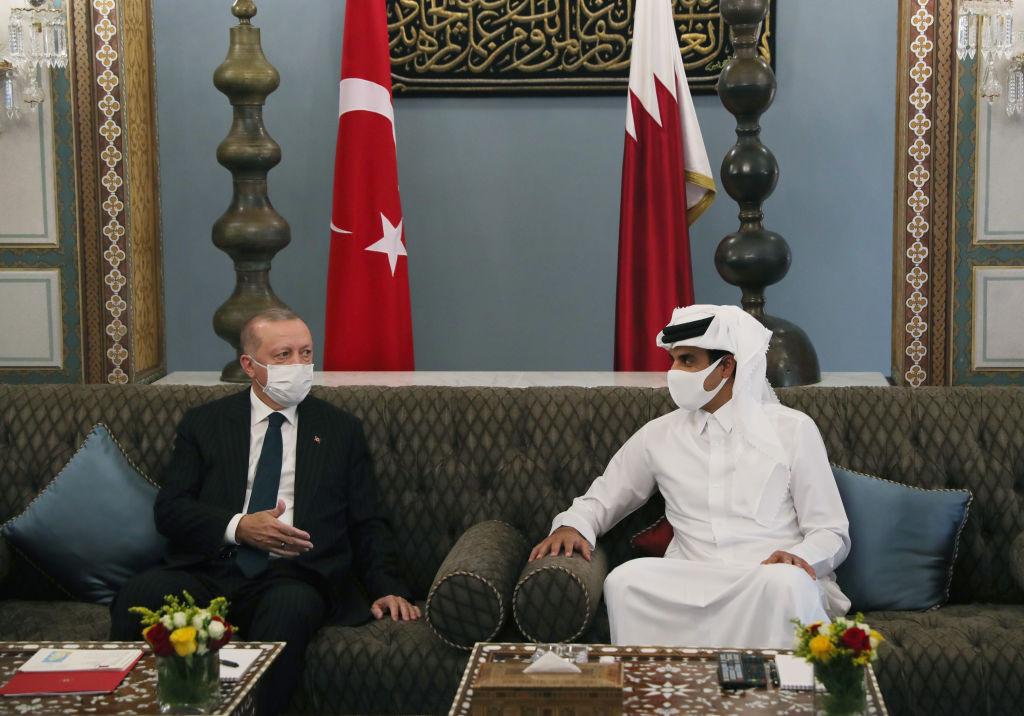
The Afghanistan fiasco has already touched off regional rivalries. The small but oil-rich State of Qatar and allied Republic of Turkey were the first off the rank, joining forces to assist the Taliban and their Pakistani backers to consolidate power and attract international recognition. What’s in it for these two distant actors?
The camaraderie between Qatar and Turkey has been crystallising largely since the pro-democracy popular uprisings, or Arab Spring, more than a decade ago. The two states have increasingly shared common regional geopolitical and strategic interests. Both Doha and Ankara supported the Arab Spring uprisings and the initial electoral victory of the Muslim Brotherhood in Egypt and its resurgence elsewhere in the Arab world, especially in the Gulf kingdoms, led by Saudi Arabia.
Saudi Arabia and two of its partners in the Gulf Cooperation Council, the United Arab Emirates and Bahrain, plus Egypt, accused Qatar of aiding terrorism and failing to toe their line against the Islamic Republic of Iran as a major regional threat. They expelled Qatar from the GCC and imposed a blockade to bring it to its knees, which heightened Doha’s fear of the old Saudi claim over Qatar.
Turkey’s President Recep Tayyip Erdogan, whose desire to be a central player in the Middle East and the Muslim world has caused Saudi Arabia and its allies to be wary, backed Qatar to overcome the difficulties and fear arising from the blockade. He beefed up Turkey’s military base in Qatar and provided it with whatever assistance it required, including facilitating its transactions with Europe and beyond. While pleased with the weakening of the GCC, Iran also rushed fresh vegetables and fruit to Qatar to meet its immediate needs.
As such, Ankara, and to an extent Tehran, aided Doha at its critical moment of need, enabling it to weather the blockade and to finally prompt its instigators, along with pressure from US President Joe Biden’s new administration, to lift the blockade in early 2021. Even so, the UAE has still not fully restored diplomatic relations with Qatar, which lends credibility to another commonly held view that Dubai has shunned the rise of Doha as a competing regional financial and economic hub.
Qatar is quite small, with an indigenous population of little more than 200,000, aided by two million foreign workers. But Doha has made good use of its oil wealth and close lucrative and strategic ties with Turkey as well as the United States, which has its biggest Middle Eastern base in Qatar, to play an important role at the regional and international levels in pursuit of an independent foreign policy. As part of this, it has not only established the Al Jazeera Media Network that expounds wide-ranging critical perspectives, including some that have irritated the conservative Arab states, but also hosted a Taliban political office since 2013.
Doha’s mediation between the US, the Taliban and other Afghan parties and its spending power proved instrumental in enticing the Taliban to conclude the peace agreement of February 2020 with the US. The deal was terribly flawed as it didn’t provide for a universal ceasefire and political settlement. But it met the US’s earnest desire for a total withdrawal of all foreign forces from Afghanistan within 14 months, which Biden extended by another four.
With the return of the Taliban and humiliation of the US and, for that matter, the world’s supposedly most powerful military alliance, NATO, Qatar has now seemingly thrown its weight behind the Taliban to make their governance operational and credible, though under the patronage of Pakistan’s powerful military spy agency, Inter-Services Intelligence.
After flying the Taliban’s deputy leader and main negotiator in Doha to Kandahar in late August, Qatar has now sent a technical team to help manage Kabul airport’s operations for both domestic and international flights. It has also indicated a willingness to make a substantial financial contribution to the Taliban’s coffers and activate the dying Afghan economy. Today, the second most important and active embassy in Kabul, after Pakistan’s, is Qatar’s. In its efforts, Qatar is joined by Turkey in assisting with the activation of Kabul’s airport and voicing a readiness to play a role in legitimising the Taliban regime.
The Qatari and Turkish approach is unlikely to go down well with the GCC members, especially the UAE and Saudi Arabia. The UAE has provided asylum to Afghan President Ashraf Ghani, who fled in total disgrace from Kabul on the eve of the Taliban’s takeover of the city. Interestingly, Ghani had the option to go to Doha, but Abu Dhabi rolled out the red carpet for him, which can be viewed as part of the two sides’ rivalry. Riyadh would be wary of developments not only because of its continued concerns about Doha’s and Ankara’s behaviour, but also because of the manner in which they could gazump traditional close Saudi ties with Pakistan, which of late have come under some strain.
Afghanistan has historically sparked outside power competitions and slapped interventionists in the face. Its potential in this respect remains very much alive in the current transition back to the Taliban. Whichever regional and global actors get involved in Afghanistan need to be conscious of this reality.